Bruinsma, Bote Gosse.
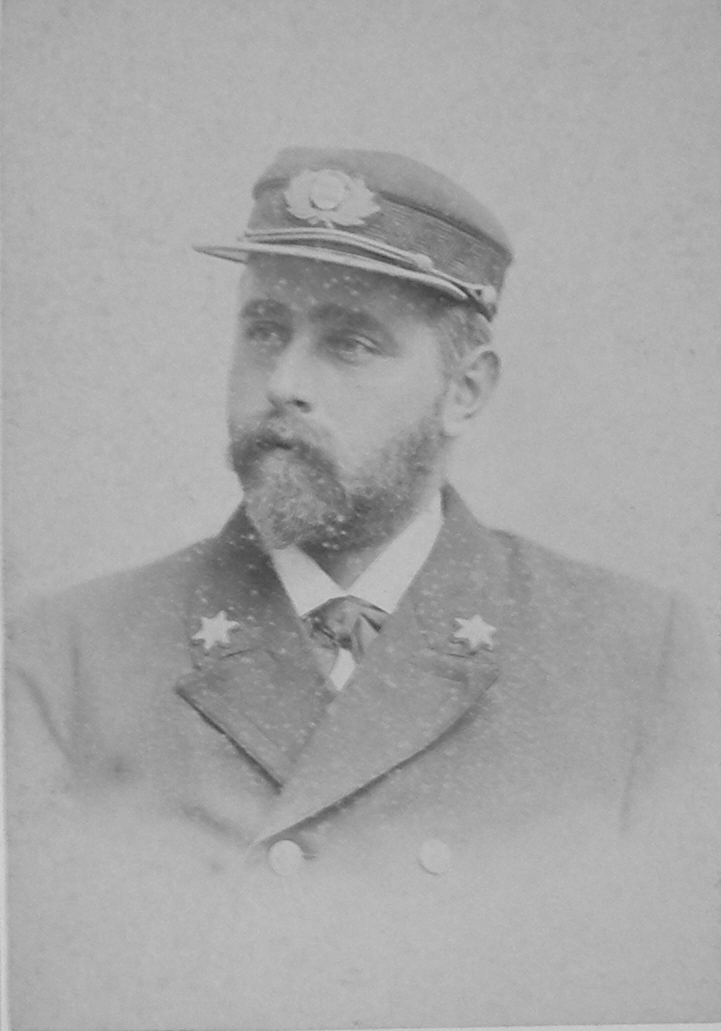
Captain Bruinsma from an 1889 photo taken during his first year in command
Captain Bote Gosse Bruinsma was born on 20 Aug 1861 at Franeker in the Dutch province of Friesland. (North West Province of the Netherlands). As a son of Pier Bruinsma and Jeltje Bos. (a)
This province has its own language “Frisian” and therefore the first names are not always similar as the rest of the Country. As he joined the company in his 25th year, there is reason to believe that he was employed somewhere else first.
He married on 25 May 1887 at Rotterdam with Mrs. Jacoba Ypelaar (born 15 Feb. 1863 at Borger) with whom he had three children. (Pieter (1888), Ida Jeltje (1889), Anna Wiecherdina (1893) Johan Bote (1894)) (a). In 1888 he is noted to be living in v/d Takstraat 2b. in Rotterdam.
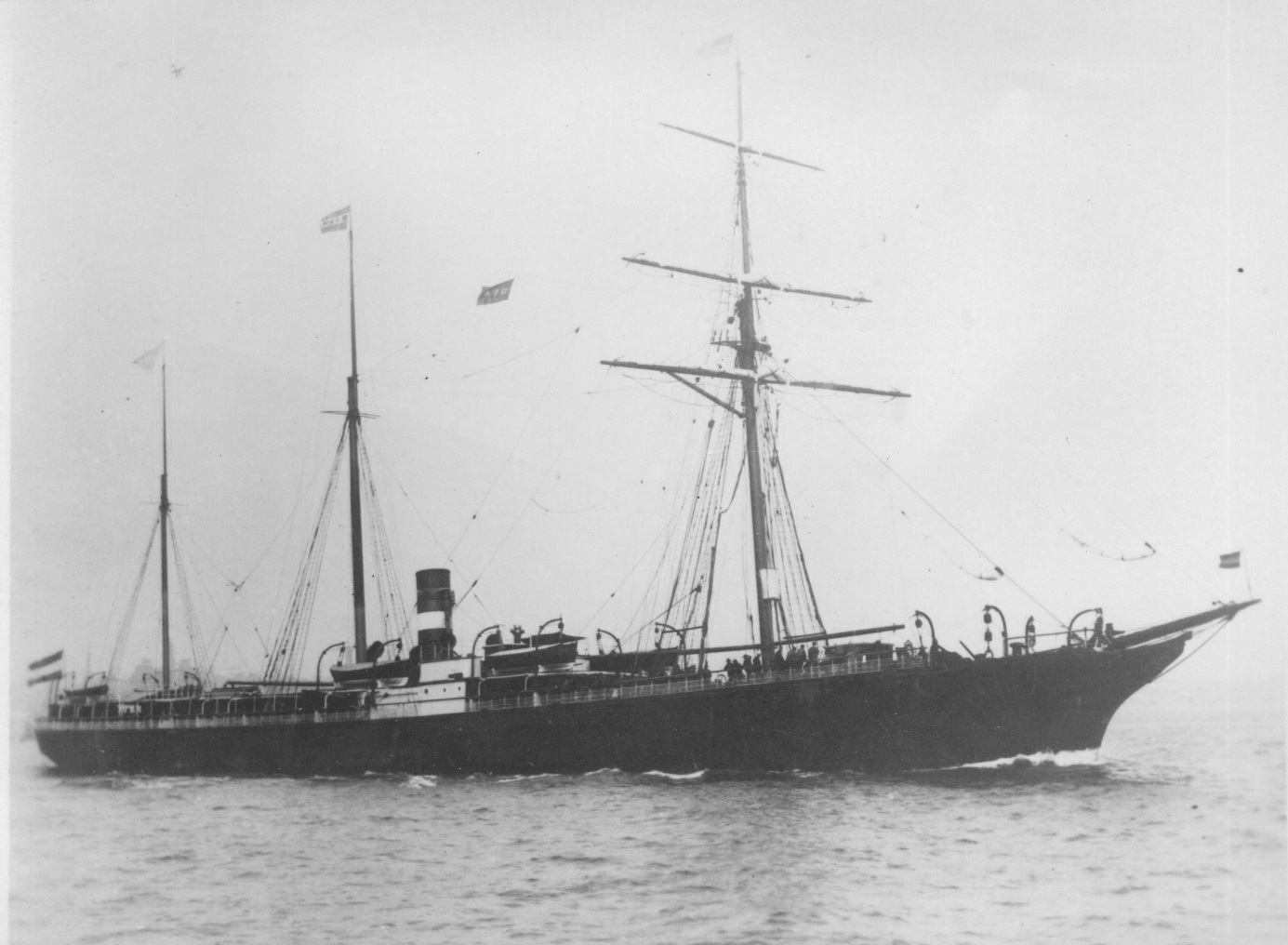
The ss P. Caland. the fourth ship of the company built in 1874. It had a small first class accommodation in the white part under the funnel and a very large emigrant accommodation on the deck under the railings which ran nearly the length of the vessel.
He joined Holland America as a 3rd officer on the ss P.Caland which was the 2nd ship built by the company in 1874 after the company went public. with the company expanding he rose through the ranks very quickly and obtained his own command after 5 years. Being assigned to the ss Leerdam (I)
Captain Bruinsma had a rather exciting career with a number of mishaps, although none of his doing. As Captain he was in command of the ss Leerdam (I), and departed for his first voyage in command when this ship sunk after a collision on 16 Dec. 1889. With that ship he had left Amsterdam on 15 December for a voyage to La Plata in South America. The company was trying to cash in on an upswing in emigrant trade to Argentina and had established a new service to this area. Two new ships (Didam and Dubbeldam) would be especially constructed for this purpose but then another revolution in the area put a complete stop to this service and both ships were re-deployed to the New York route and later sold.
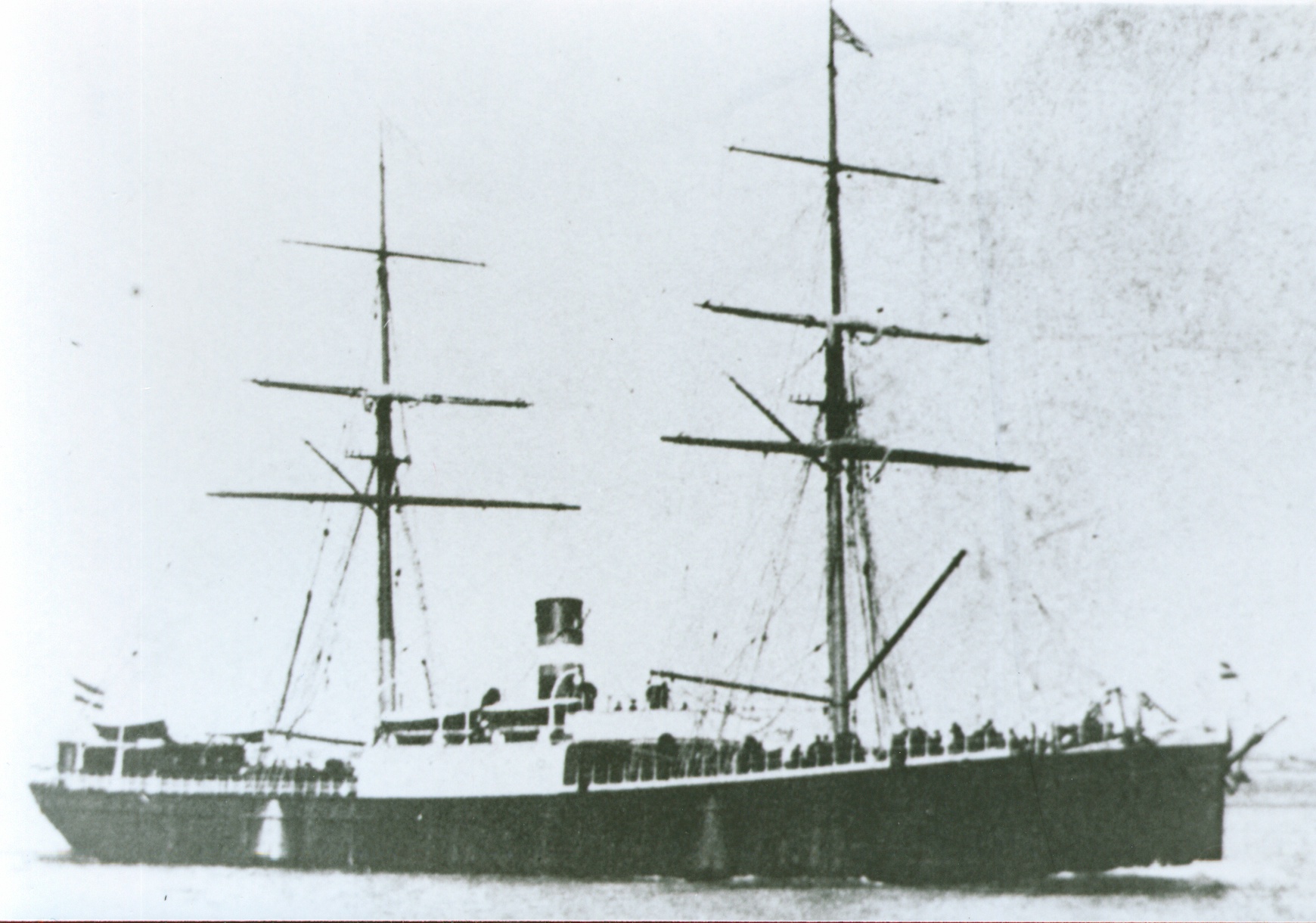
The ss Leerdam (II) It is assumed that this photo was taken during a departure from New York.
While steaming south bound towards the English Channel the ship hit on the portside by the British ss Gaw Quan Sia. On board 19 First Class and 426 emigrants. Both remain stuck together and eventually both ships sink but after a prolonged time so that there was plenty of time to safe them all. Captain Bruinsma had ordered an extensive amount of food supplies to loaded into the lifeboats so everybody could eat and drink while waiting for the rescue. (This helped once on board the rescue ship as they could not cater for soo many. But they did provide wine taken from the ships cargo.) Because the crew of the Gaw Quan Sia had not used all their lifeboats, 3 were taken over by Captain Bruinsma to gives all the passengers more space. A passing German ship the ss Emma (Kapt. Brinckmann), picks everybody up and lands them safely in Cuxhaven. From there everybody was transported to Hamburg and from there sailed for Rotterdam on 23 December.
He is promoted to full captain in 1890.
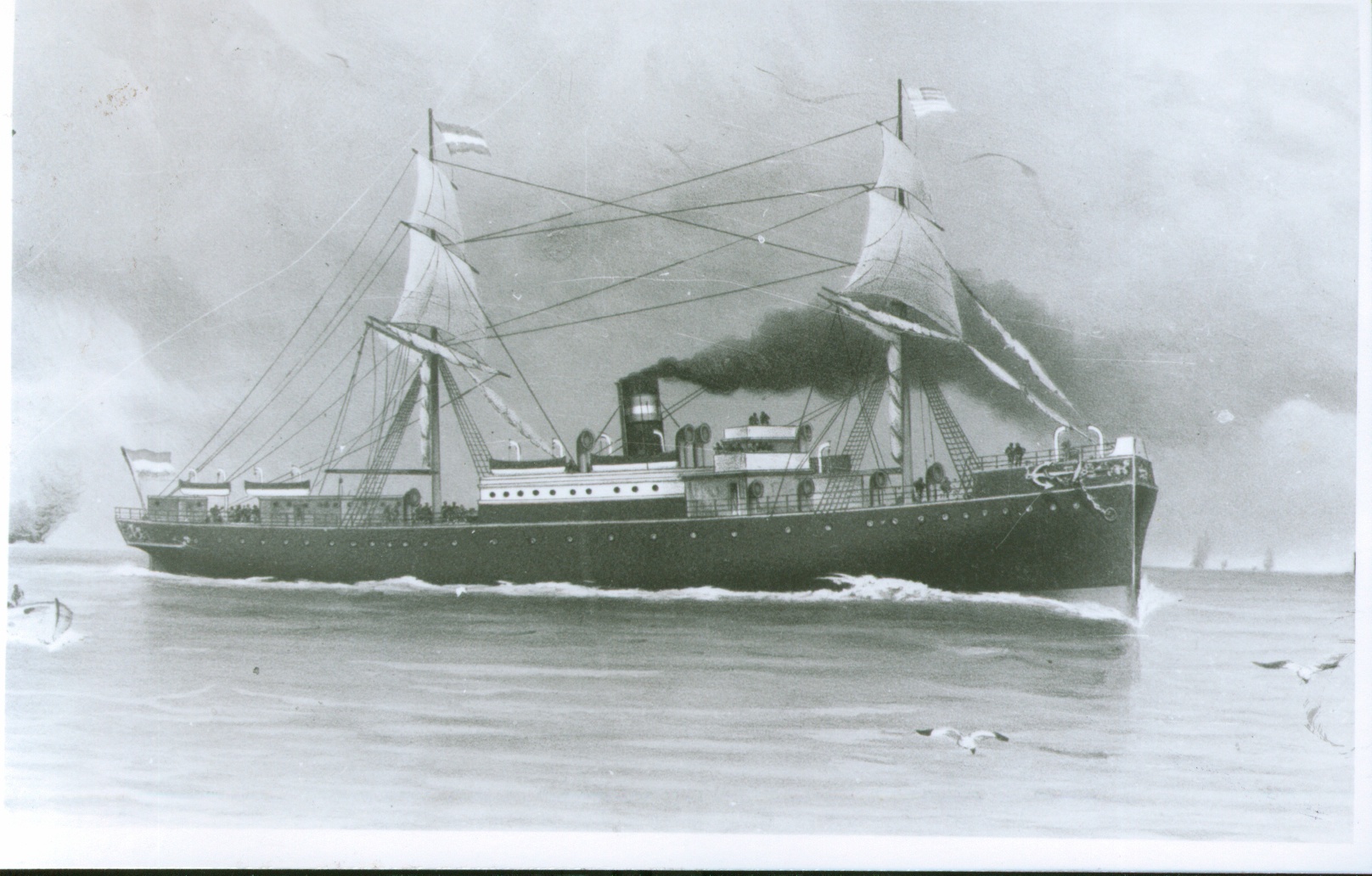
The ss Edam (II) It is very strange but from this ship there are no known photos. Only two paintings.
Then in 1895 he loses his ship the Edam (II) after a collision with another ship the ss Turkistan (Anglo Arabian & Persian Steamship Company). Just before 1 am. In the morning of the 19th. of September while on the way from New York to Rotterdam with 40 crew and 45 passengers , sailing at slow speed in dense fog, the ship is hit by the ss Turkistan which suddenly shows up out of the fog. This was a bigger ship and was sailing in ballast (empty with extra weight to ensure enough stability)and she hit the ss Edam port aft near the engine room. Causing so much damage that the Edam sank, luckily without loss of life. The Turkistan then disappeared in the fog again. (b) Once all passengers were safely landed, they travelled to London and from there to London for the ferry to Vlissingen (Flushing) and from there to Rotterdam. These passengers were mainly emigrants who were returning home as their new country was not what they expected. The crew was put up in a sailor’s home in Plymouth for the subsequent investigation and then transport home.
At a subsequent inquiry at the court of Arbitrage in London it was established that both ships were exchanging fog-sound signals but that the Turkistan was travelling too fast, did not try to go astern once the Edam was seen and did not hove to after the collision to offer help. Captain Bruinsma was fully in the clear; but a note in the company records indicate that the loss of his ship affected him for quite some time but that the company’s management was squarely behind him. Maybe two disasters in 5 years caused a considerable amount of stress.
From then on his career pattern follows the regular company tradition. Appointments to larger and larger ships based on seniority. On 3 Aug. 1906, while in command of the ss Statendam (I) he receives the company medal for having made 100 successful crossings as a captain. He is then the 7th. Captain in the fleet to successively managing to do this.
He asked for retirement in 1911 as his health was giving in and passed away on 06 April in 1916 in Rotterdam at the age of 54
Leaving behind a wife and 3 children. If he could have stayed the course until his compulsory retirement at 60 at 1921/1922, then he would have ended his career as the senior Master of the company and Commodore.
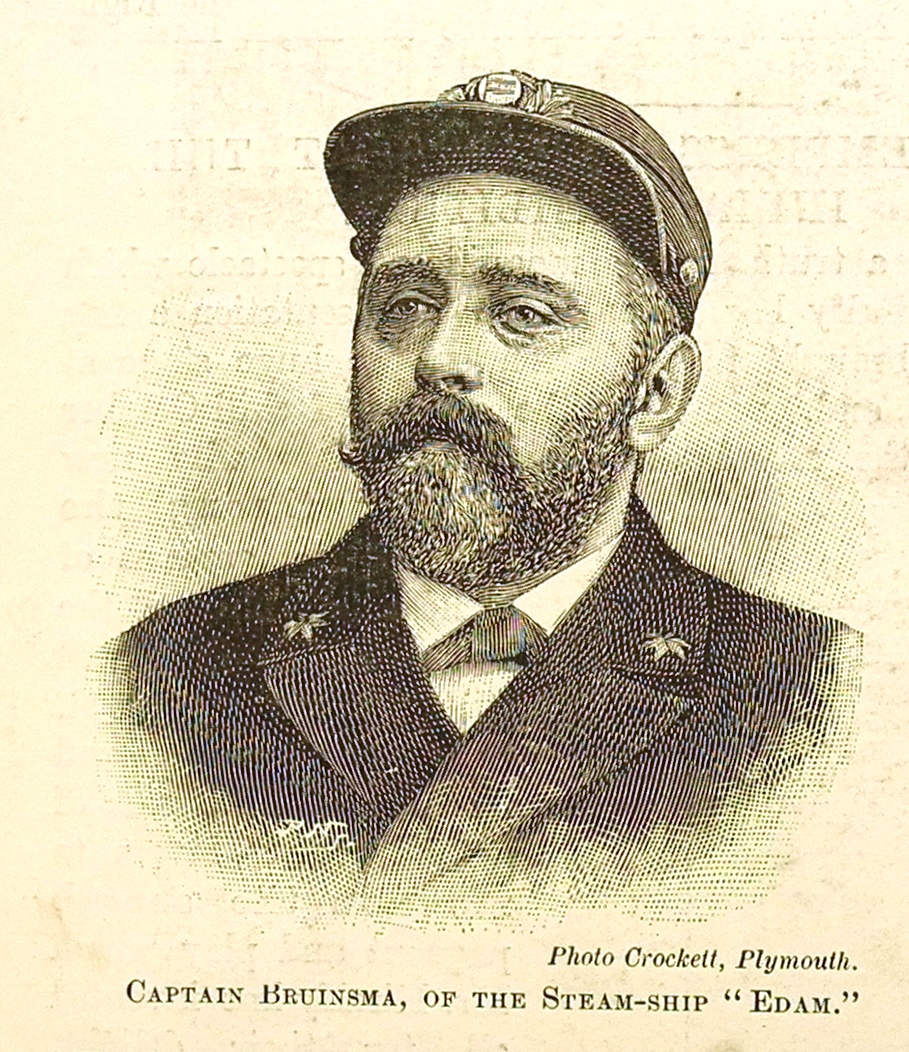
This picture was taken in 1895 when Captain Bruinsma came ashore in Plymouth after the sinking of the Edam. There are no other photos known of him in later years.
Career listing (d)
Date: Function: Ship: Wages and/or remarks.
15 Jun. 1885 3rd officer P. Caland 40,–
28 Jul. 1885 temporary dismissed due to over complete
13 Aug. 1885 3rd officer Leerdam 40,–
23 Jun. 1886 act 2nd officer Leerdam 60,–
14 Sep. 1886 with the Harwich boat to Liverpool, for the ss Rotterdam (a)
14 Sep. 1886 2nd officer Rotterdam 60,–
02 Feb. 1887 2nd officer Leerdam 60,–
26 May. 1887 dismissed on own request for exam passes July 1887
04 Aug. 1887 2nd officer Rotterdam 60,–
16 Apr. 1888 dismissed for exam
19 Jun. 1888 2nd officer Leerdam
02 Aug. 1888 Act. First officer Leerdam 100,— married
23 Oct. 1888 First officer Veendam 100,– (maiden voyage ship)
26 Jun. 1889 pay raised to 110,–
28 Aug. 1889 First officer Maasdam 100,–
From new York per ss Germanic to Liverpool
10 Dec. 1889 Act. Captain Leerdam
16 Dec. 1889 Act. Captain Leerdam
Sunk after collision with ss Gaw Quan Sia with the ss Emma landed in Cuxhaven.
22 Dec. 1889 Back in Rotterdam
30 Dec. 1889 First officer Schiedam 130,–
24 Feb. 1890 Act. Captain Schiedam
at Buenos Aires hand over of command
18 Apr. 1890 Captain Schiedam 200,– permanent
20 Jul. 1891 Captain Schiedam
removed from command and per ss Didam back to Amsterdam
04 Aug. 1891 Captain Edam
16 Nov. 1891 Temporary dismissed
28 Dec. 1891 Captain Edam 200,–
20 Sep. 1895 Due to loss of Edam temp ashore
05 Nov. 1895 Captain Caland 200,–
28 Jul. 1896 Captain Zaandam
03 Oct. 1896 Relieved of command at new York and leaves
with the ss Etruria from NY to Amsterdam to go to Edam
11 Oct. 1896 Captain Edam ex Rotterdam
19 Oct. 1898 Temporary dismissed and available
26 Oct. 1898 Captain Werkendam
16 Feb. 1899 Temporary dismissed and available
24 Mar. 1899 Captain Werkendam
01 Jun. 1900 Appointed as Terrein chef loods Rijnhaven. (Depot Master Cargo Shed at Rijnhaven)
10 Dec. 1900 Captain Amsterdam
07 May 1901 On standby
?? Aug. 1901 Captain Soestdijk 200,–
01 Oct. 1901 On standby due to illness
08 Apr. 1902 Captain Soestdijk 200,–
28 Jul. 1903 Captain Sloterdijk 200,–
14 Sep. 1903 Captain Soestdijk 200,–
08 Apr.1904 Captain Amsterdam 200,–
01 Feb. 1905 On standby
15 Feb. 1905 Captain Rotterdam
09 Jan. 1906 On standby
24 Jan. 1906 Captain Statendam 200,–
12 Oct. 1907 Stayed behind in Boulogne Sur Mer due to illness
19 Oct. 1907 With the ss Rijndam to Rotterdam and put on standby
02 Apr. 1908 Captain Statendam 200,–
25 Jun. 1908 Captain Rijndam 200,–
08 sep. 1908 Captain Potsdam 200,–
15 Sep. 1908 Captain Statendam 200,–
13 Mar. 1909 Captain Potsdam 200,–
26 Nov. 1909 Captain Statendam 200,–
20 Jan. 1910 Captain Rijndam 200,–
02 Feb. 1910 Captain Potsdam 200,–
01 Jan. 1911 Captain Potsdam 350,–
07 Mar. 1911 Dismissed on request.
- (a) E.A Kruidhof
- (b)The Telegraph Sept. 1895.
- (c) Stamboek 589 page 6 of personnel files of the HAL Archives as held by the Municipal Archives in Rotterdam
- (d) Captain Alberts HAL voyage database denoting all the voyages of all Holland America Lines ships, with information obtained out of Mouvementboeken (Hal Archives), Dutch Newspapers, Passenger Lists and other ancillary information.
Last updated: 30 May 2021

July 31, 2020 at 2:57 am
My grandfather, Marcus Davidowsky, was emigrating from Elizavetgrad, Russia to America and he was told, when he and his family were in Rotterdam on April 9, 1906 (when Captain Bruinsma was Captain of the SS Statendam, getting set to leave Rotterdam for NYC on April 14, 1906) that he should see the “settlement captain” about an extra charge that had to be settled. The details of this are known to the Rotterdam city archives. Is the settlement captain the same as “captain”? I think that my grandfather was given charity by “Hilfsverein der deutchen Juden,” and it appears when buying his tickets (9) he needed more money for the nine people in his family with him. Another son had just been killed in the Russian pogrom of 1905. Did Captain Bruinsma help him? Did the Captain keep a diary? Is there anything written that would explain what happened when he went to see the “settlement captain?” Remarks on the line: “SS belast met M 609.90, W (with a line over the W)3 zie afreck Kap 9/April/1906” Written on the right hand side of the HAL book, “bemerking” (Remarks).
August 1, 2020 at 7:41 pm
Thank you for reading my blog.
I do not come very often across somebody who mentions the “settlement captain”. No this was not the real captain but the chief cashier on board, who was part of the Pursers staff. I have come across this confusing title was before and also from an person whose ancestors left Russia. I do not speak Russian but it was explained to me that it is not easy for a Russian to translate paymaster or related into English. There are various words raschet or kaznachey or glavny chelovek which come close to paying or settlement or treasurer or cashier or headman but it remains inconclusive. So the local agents used the word captain for anything to denote authority on a ship. (Not much has changed, it still happens when something complicated is taking place) Thus your forefather would have ended up with a pursers clerk in due course. Settled his account one way or the other (otherwise he would not have been able to leave in New York) and that information would have then eventually made it back to Rotterdam. Captain Bruinsma would not have been involved in an official capacity.
I hope this helps, and thanks for sharing.
Best regards
Capt. Albert
August 2, 2020 at 10:53 am
To Captain Albert. I thank you so much. This clears up many thngs, and bring to mind a couple of new things.
1. The chief cashier. I am trying to find out if “Hilfsverein” sent money to Brody (the HAL agent, P. Kappeler & Sohn). Were these agents authorized to receive money from a charity before the intended recipient arrived in Brody? On the page for my grandfather (gf) in Rotterdam, the words appear (concerning Brody) “no railroad order booked by P. or J. Kapeler & Sohn in Brody.” (This under the column, “Geboekt door.” Does that mean that money was wired to the the HAL agent in Brody before my gf arrived in Brody?
2. What is the “stamboek”? Sounds like a diary or a “ship’s log.” I am not a sea-going person.
3. Would there be a book kept by the Chief cashier? Would it be in the archive? I know that these questions are not about the ship and its captain, but I thought you might have come across this. It seems to me that the HAL, by sending my grandfather to the chief cashier was a great help to him and our entire family and those emigrants in a similar situation. Are there memoirs by historians on this? I’d like to thank someone at the HAL.
4. Under remarks (“bemerking”) of the record at Rotterdam in 1906 are the words: “SS belast met M 609.90 W (with a line over the top of the W) zie afreck Kap 94/’06” The City Archives was very helpful with interpreting these words, but did find some “mysteries.” I guess that is what makes history interesting. Another emigrant had the same remark next to his name.
All the best, Harry
August 2, 2020 at 7:37 pm
Good morning,
as a follow up to your questions:
1. I do not know exactly how the relation as between the Rotterdam Head office and their agents. What I do know is that they agents delivered a “complete package” e.g. the emigrant arriving in Rotterdam was ready to go with all finances and paper work in place and was then put on board pending a final health check. This the agent which have received all what was necessary before putting your Grand Father on the train to Rotterdam.
2. Stamboek is a real book or ledger in which the details of all the officers were kept. It lists until 1937 (when the administration was updated) all the sailing dates of the Captains and the Officers. It was used by HR to count the sailing/pay days and I use it to trace the captains for my website.
3. There would be adminstration but all the receipts and chits etc. would be used to compile the final passenger manifest for landing the prospective immigrant and then eventually those papers would be destroyed.
4. I have no idea what those notations mean. I know that each agency or independent agent who received a commission had an identification number as there were so many (before WWI a lot of shop keepers in Easter Europe had a little emigrant business on the side, either via the General Agent of the area, but sometimes also directly they could correspond in English, Dutch, French or German. I have never been able to locate a ledger list of all these agents. It was either not kept or list in the 1953 floods, when the HAL archives were severely damaged.
Best regards
Capt. albert
August 5, 2020 at 4:29 pm
Captain Albert, you have been a big help. I appreciate the time and effort (and knowledge) you have devoted to my two posts. I guess for what I am writing – I will have to so some “guessing.” I hate to do that. But here goes. What do you think of this?
The “coded” words (?) mean that Captain Bruinsma, or some other official at HAL, thought someone should talk to my grandfather and explain to him the danger he may be getting himself into when he reached Ellis Island, for three reasons:
1. He had been to America before in 1889, but came back to Russia so he may have thought things would be the same in New York, but he may not have known that Ellis Island was new, and when he came the first time, it may have been easier to enter America.
2. My grandmother was pregnant, and sometimes that was used as a reason to detain aliens. Here there were nine of them including 7 children, all under 13 years old (My mom was an infant, of 18 months). Grandma was almost 7 months pregnant. That by itself may not have been a problem since she was traveling with grandpop, her husband. What the American authorities wanted to stop was allowing pregnant woman who were trying to enter the country, admitted to the country when they were single (not married).
3. Grandpop did not have much money. I think he arrived at Ellis Isalnd on April 25, 1906, with $13.
I think HAL tried to be fair to the family in 1906, and maybe they were trying to tell the nine of them that there is danger in being deported. Russia may not have let them back in. But that did not seem to bother either one of my grandparents. They were hearty and willing to take risks.
I don’t think that happens often, but with nine of them, they sure stood out in a crowd on the pier in Rotterdam.
Thanks so much for your thoughts. It makes me feel good when I listen to someone who delights in telling what the real stories are.
Stay safe,
Harry
3.
August 2, 2020 at 11:38 pm
Hi Capt. Albert. As you know, our family sailed on the SS Statendam in April 1906. Could you give me some words or phrases to put in an article I am writing for a genealogy journal to describe the interior of the ship, and the living and eating conditions on board, especailly for the third class passengers. The family consisted of my 43 year-old grandfather, my 40 year-old grandmother, daughters, 13, 12, and and 7. My mother was less than two years old, and my grandmother was pregnant again. My uncles were were 11, 7, and 5. I think the voyage was from April 14th to April 25th. I guess the spring weather on the Atlantic is not as rough as it is in the winter. The ship was built in 1898.
Is there a photo that you have the rights to showisng the ship in the port of Rotterdam. I have a photo of the ship from the stern, but do not know where or when it was taken. I obtained the photo from an American museum.
Could the kids play on deck? Did all the passengers sleep in one large room? How was the food? My grandfather died before I was born, and I never thought to ask my grandmother (she died in 1953). If I can get a photo from you I will ask the publication, titled: “Avotaynu (Our Fathers), The International View of Jewish Genealogy,” for a copy. If they print the article, I would be happy to send a copy to you as a gift.
I will need an address; I guess it will come out about Christmas. The Journal is in its 37th year.
Thanks for all your help, Harry
August 5, 2020 at 9:03 pm
good morning,
this will cost me a bit of time and wold be a long email, So give me few days and I will answer from my hobby email Captalbert1@aol.com
Best regards
Captalbert
May 27, 2021 at 6:05 pm
Thank you for writing this. Captain Bruinsma is my great-great-grandfather, and it’s really cool to learn about his life like this. He really kinda looks like my dad actually. We still talk about him sometimes in our family. And my grandfather still has the awards that he got for his service. It’s great to find a story on him on the internet like this.
January 15, 2023 at 7:24 pm
I am the cousin of Bote Gosse Bruinsma he died 8. Januari 2023
he was born 25.Juli 1931 Rotterdam
we go to his Funeral, Stefanie Snedisch, Wilfried und Christel Sprajc
he was our cousin
my Father was Franz Sprajc and Stefanie is daughter of Maria Sprajc
and Bote is son of Anna Sprajc/ Bruinsma
May 24, 2023 at 4:19 pm
My Great, Great Grandfather, Reinhard Brown, and part of his immediate family sailed on the T.S.S. Rijndam from New York to Rotterdam in July of 1908 when Captain Bruinsma had command of the ship. One of Reinhard’s sons wrote some notes about their trip that included:
‘Water temperature was taken every hour to see if the ship was in the Gulf Stream or in iceberg territory.’
‘Passengers saw large school of spouting whales and large fish jumping next to the ship.’
Passed many fishing boats and at least one large ocean liner, the Lusitania, on the 5th day of voyage and spotted the English Coast.’
The ship traveled 360 to 380 nautical miles per day and took 9 days to reach Boulogne before traveling on to Rotterdam.
May 24, 2023 at 5:54 pm
thank you for your comment, much appreciated. I had heard about the temperature taking but it great to see confirmation by an eye witness.
Your G G Grand father was on voyage 60 of the Ryndam indeed under the command of Captain Bruinsma. the ship left New York on 15 July and sailed for Boulogne Sur Mer where it arrived on 24 July in the early morning hours. after a short stop it made it to Rotterdam on the same day for the end of the voyage.
thank you for your comment.
Best regards
Capt. Albert